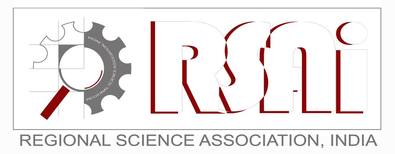About us
The Regional Science Association International (RSAI)
Founded in 1954, the Regional Science Association International (RSAI) is an international community of scholars interested in the regional impacts of national or global processes of economic and social change. The work of RSAI draws on the expertise of many different disciplines and this multi-disciplinary approach helps to facilitate new theoretical insights for tackling regional prolems. In turn this provides an increasing opportunity for academics within the Association to engage more fully with planners and policy makers. Building on a strong foundation of quantitative methods, regional science is at the cutting edge of research into new model design for regional analysis and impact assessment.
Regional Science Association of India
The Indian Chapter of the Regional Science Association was initiated on September 7, 1967 by Late Prof. Walter Isard at the conclusion of the First International Regional Science Conference at IIT Kharagpur as a section of Regional Science Association International, then headquartered at University of Pennsylvania, USA. Prof. Isard was President of the Association at the time. Professor Chitta Ranjan Pathak located it at the Department of Architecture and Regional Planning of the IIT Kharagpur, and has nurtured it since then and is presently located at Kolkata, India.
The Association in India functioned independently since then. The first President of the Association was Prof. V. N. Prasad, an eminent Indian planner, with Prof. C.R. Pathak and Prof. A.N. Bose as secretaries. Over the years,the Association has grown from strength to strength, but is still a relatively compact organisation, having 250 Life Members and about 180 Annual Members. It started publication of thebi-annual Indian Journal of Regional Science in 1968-69, aimed at publishing good quality research papers selected through a peer review process. It reaches out to 170 University Libraries. The Association holds its annual conferences on a regular basis. Premier institutes, Universities and learning centres across the country have hosted the Regional Science Conference over the years. Its International conference have been hosted by IIM Bangalore in 2006, University of Calcutta in 2016 and University of Tripura in 2017. The School of Planning and Architecture, University of Mumbai, Nirma Institute of Technology, University of Baroda, the North Eastern Hill University are many other Institutes have hosted subsequent events.
The Association in India functioned independently since then. The first President of the Association was Prof. V. N. Prasad, an eminent Indian planner, with Prof. C.R. Pathak and Prof. A.N. Bose as secretaries. Over the years,the Association has grown from strength to strength, but is still a relatively compact organisation, having 250 Life Members and about 180 Annual Members. It started publication of thebi-annual Indian Journal of Regional Science in 1968-69, aimed at publishing good quality research papers selected through a peer review process. It reaches out to 170 University Libraries. The Association holds its annual conferences on a regular basis. Premier institutes, Universities and learning centres across the country have hosted the Regional Science Conference over the years. Its International conference have been hosted by IIM Bangalore in 2006, University of Calcutta in 2016 and University of Tripura in 2017. The School of Planning and Architecture, University of Mumbai, Nirma Institute of Technology, University of Baroda, the North Eastern Hill University are many other Institutes have hosted subsequent events.
BITS Pilani, K K Birla Goa campus
BITS Pilani, K K Birla Goa campus, currently houses 10 departments spanning the gamut of pure science, applied science, humanities and management. Each of these departments is notable for their excellent faculty, the curriculum offered, the research it conducts and the number of sponsored projects the department has won.
The European Regional Science Association (ERSA)
The European Regional Science Association (ERSA) is the supranational grouping of national regional science associations across Europe. Members are academics, policy professionals and researchers interested in spatial economics and planning, regional and local development and related issues. They are drawn largely from the disciplines of economics, geography and planning. There are presently 19 active associations (commonly named ’sections’), some, such as the German or French speaking sections, organized on linguistic groupings and covering more than one country. Constituent associations range in size from more than 700 members to 27. The largest sections have their own national professional organizers. In total ERSA has some 3500 members in its constituent associations.




